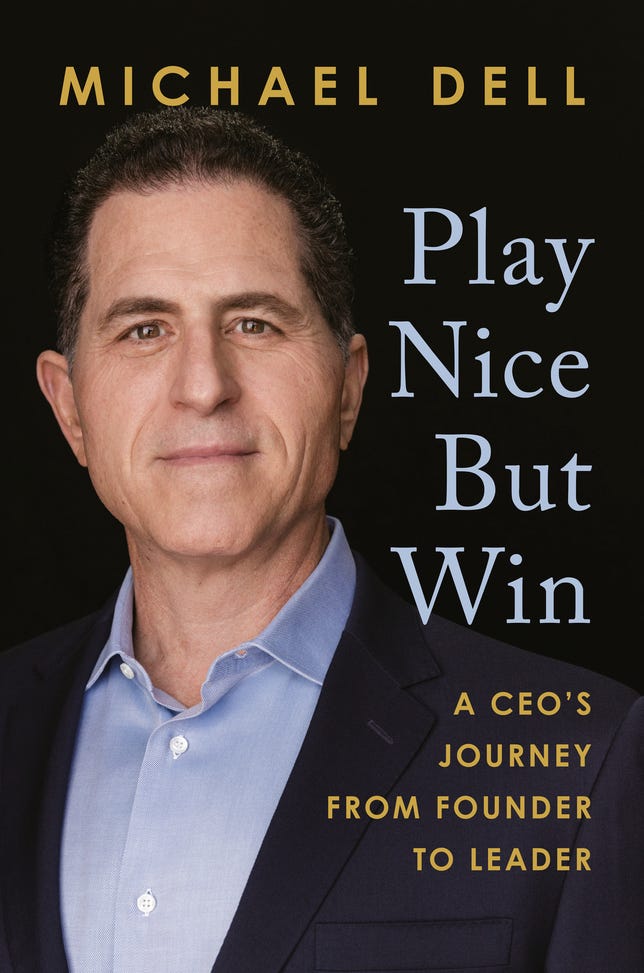Michael Dell begins his new book with a story about a mediocre meat loaf dinner with the man who turned out to be one of his greatest business foes.
The year was 2013, and Dell had convinced the board of the PC maker he started in his college dorm room in Texas to take the publicly held company private. He decided it was time to reset the business and make new investments for Dell Inc., but his plan would only work without being scrutinized — and judged — by financial analysts and shareholders.
Though it was a challenge to convince his board of directors that taking Dell Inc. private was the best move for the company, the bigger fight ended up being a “nine-month drama” with activist investor Carl Icahn, who argued that Dell was undercutting shareholders as he pushed for a higher bid price. Icahn’s battle for control of the company didn’t succeed, though he did make money off his play for Dell Inc. And the story about what happened behind the scenes is the backdrop against which Dell frames his new book, Play Nice but Win: A CEO’s Journey from Founder to Leader, which was published by Portfolio/Penguin this month.
He says he hopes the takeaway for readers is they shouldn’t let fear stop them from working on something they’re passionate about.
“I want people to have a real sense for the importance of taking risks — and don’t feel like you’ve got to follow every rule that’s out there,” Dell, 56, says in an interview for CNET’s Now What interview series.
“I have this deep-seated belief that a lot of people don’t realize their full potential because they’re too afraid to fail and too afraid to make mistakes,” he tells me. “There’s so many ups and downs and twists and turns. In the first couple of years of business [we] could have failed at least 10 times, with all sorts of things that were going on. But that’s reality, and that’s how I think great businesses are built.”
What do we learn about Dell from his book? A few things, starting with the fact that he’s a serious tech geek who took apart his Apple II as a 14-year-old right after he unboxed it, out of a desire to see how the machine worked.
And we learn just how serious a risk-taker he is, running a computer company out of the bedroom of his college dorm (packed to the ceiling with parts and inventory) and driving around Texas to buy up parts and resell machines with barely enough cash flow to keep going.
We also learn he’s got a pretty good sense of humor, which brings me back to the meat loaf story. Keeping in mind his parents’ advice — play nice but win — he decided to call Icahn while visiting New York midway through their shareholder fight. Dell says he wanted to meet his nemesis face-to-face so he could hear firsthand what Icahn planned to do with the company if his takeover bid succeeded. Icahn, he writes, was surprised by his call but invited him for dinner, after warning him that his wife “is just a terrible cook.”

Portfolio/Penguin
Dell writes that he listened to the story of Icahn’s life and business dealings; then he gives readers this summation: “I cut my meat loaf and ate a bit. Carl hadn’t been far off about his wife’s cooking. And I hadn’t been far off in my estimate of him as a human being.”
While the Icahn battle is the thread that he returns to throughout the book, Dell provides insight into how he built his PC business from scratch, including traveling to Asia to cut deals with suppliers so he could keep his prices below the costlier IBM PCs of the time. He talks about growing the business and taking it public. He’s candid about being behind the PC market in designing and selling laptops as customers shifted away from desktops.
And he shares stories about his friendship with Steve Jobs and about how Apple’s co-founder offered to license the Mac operating system software for distribution on Dell’s low-priced but fast-selling Intel-based PCs as Apple was months away from bankruptcy. Jobs’ pitch: Install the Mac OS on every Dell PC, alongside Microsoft’s Windows OS, and leave it up to customers to decide which software to use. The hitch: Jobs wanted a cut for every PC sold. Dell acknowledges the deal was a what-could-have-been moment in tech history.
“It could have changed the trajectory for Windows and Mac OS on PCs,” Dell says. “But obviously, they went in a different direction.”
We also talked about the future of work, and the tech industry in a post-pandemic world. Dell says the rules are still being written, but he’s sure there’s no returning to the old normal.
“We’ve had this glimpse of the future, and I don’t think we’re going to go back at all to the way it was,” Dell says. “We’ve all figured out that work is something we do, it’s not a place. There can be places where we congregate together to collaborate or be together in person, because we like that interaction and social connection, but hybrid work is here to stay.”
Hear our entire conversation in the video above.

Now What is a video interview series with industry leaders, celebrities and influencers that covers trends impacting businesses and consumers amid the “new normal.” There will always be change in our world, and we’ll be here to discuss how to navigate it all.










